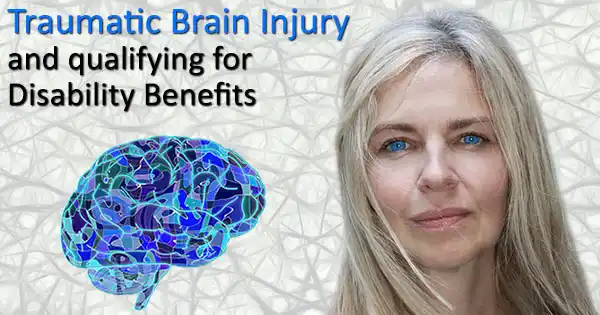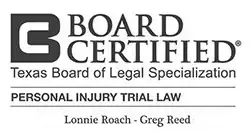Traumatic Brain Injuries and Qualifying for SSDI
Can I get disability benefits if I am suffering from the effects of Traumatic Brain Injury?
Author Attorney Lloyd Bemis:
Updated 9/27/2024
Summary: Can I get disability benefits if I am suffering from the effects of a traumatic brain injury?
First you must meet the SSA’s financial requirement: You must have worked long enough, recently enough, and not made over a predetermined level of income.
Second you must meet the medical requirements:
To qualify for benefits you must exhibit either disorganization of motor function in two extremities, which severely limits the ability to stand, balance, or use upper limbs for a minimum of three consecutive months post-injury, or marked limitations in physical functioning alongside significant impairments in one area of mental functioning. The areas of mental functioning that must be affected include understanding and applying information, social interaction, concentration and persistence, or self-management, also for at least three consecutive months.
It is crucial to compile comprehensive documentation of all medical treatments and the physical and mental limitations resulting from the TBI.
It is estimated that 1.7 million people experience a traumatic brain injury each year in the U.S. Traumatic brain injury (TBI) occurs when a bump, blow, or jolt to the head damages brain tissue and disrupts normal brain function. TBI can also happen when an object pierces the skull and penetrates brain tissue. Symptoms can be mild, moderate, or severe, depending on the extent of damage to the brain. A person with a mild injury may be unconscious seconds or minutes, while the worst injuries can lead to permanent brain damage or even death.

The SSA recognizes Traumatic Brain Injury in its Blue Book under Section 11.18. To qualify for Social Security Disability benefits a person must meet the requirements of the listing or prove that they are unable to work.
Everyone is at risk of TBI, particularly young children, young adults ages 15 to 24, adults over the age of 60 and males of any age. A variety of events can precipitate a TBI:
- Falls – from a ladder, roof, bed, or in the bath
- Car and motorcycle accidents
- Violence – gunshot wounds, assaults, domestic abuse
- Sports injuries – football, boxing, baseball, soccer, hockey and other high impact sports
- Explosive blasts; for example, combat injuries
Traumatic brain injury can damage the brain in different ways.
It can cause areas of pressure within the brain referred to as a mass lesions, the most common of which are hematomas and contusions. A hematoma is a blood clot anywhere within the brain or on its surface and a cerebral contusion is bruising of brain tissue. TBI can also cause bleeding within brain tissue (intracerebral hemorrhage) or microscopic changes in the brain that cannot be detected on a CT scan (diffused brain injury). These brain injuries may result in insufficient blood supply to certain parts of the brain (ischemia) or damage nerve cells and lead to permanent disabilities.
Contact a Social Security disability attorney at 512-454-4000 for a free consultation and see if you can get disability benefits while suffering from Traumatic Brain Injury. If you have been denied disability don’t give up!
TBI can manifest in a wide range of physical and psychological effects. Some symptoms appear immediately while others may take days or weeks to appear.
- Loss of consciousness
- Headaches
- Nausea and/or vomiting
- Slurred speech
- Difficulty sleeping or sleeping more than usual
- Blurred vision
- Ringing in ears
- Dizziness, loss of balance
- Sensitivity to light or sound
- Changes in taste or smell
- Memory problems
- Difficulty concentrating
- Mood swings
- Depression or anxiety
- Loss of coordination
- Paralysis
- Inappropriate emotional responses, such as aggression
- Numbness and tingling in the body
These symptoms can cause you to miss work and jeopardize your ability to maintain employment.
A traumatic brain injury affects all aspects of an individual’s life, even their personality.
TBIs differ from injuries like a broken leg or a broken arm in that a broken leg will heal and a person will eventually regain its function, but an individual who sustains a traumatic brain injury may not recover some physical and mental abilities. Approximately 80,000-90,000 people experience the onset of a long-term or lifelong disability associated with TBI each year.
The Social Security Administration recognizes traumatic brain injury as an impairment under Section 11.18 in its Blue Book.
Social Security defines TBI as brain damage caused by a closed head injury, penetration by an object into the brain tissue, or a skull fracture.
In order to qualify for benefits under the listing, your medical records must document that you experience:
- Disorganization of motor function in two extremities, resulting in an extreme limitation in the ability to stand up from a seated position, balance while standing or walking, or use the upper extremities, persisting for at least 3 consecutive months after the injury.
- Marked limitation in physical functioning, and in one of the following areas of mental functioning, persisting for at least 3 consecutive months after the injury:
- Understanding, remembering, or applying information; or
- Interacting with others; or
- Concentrating, persisting, or maintaining pace; or
- Adapting or managing oneself.
OR
It’s very important to provide documentation of all medical treatment and physical and mental limitations resulting from your TBI to Social Security including emergency room records, notes from medical providers, x-rays, CT scan and MRI results, neuropsychological testing results and statements from family, friends, co-workers and employers.
Be sure to submit documentation for other conditions you may have such as depression, PTSD, or anxiety. The more evidence you submit to substantiate your condition, the better your chances are for approval.
An applicant with mild TBI usually does not qualify for SSDI benefits, but people who have suffered mild TBIs may be approved for disability under a medical-vocational allowance.
If you don’t meet the requirements of the TBI listing, Social Security will measure your residual functional capacity (RFC) to determine whether you can still perform your current job with your physical and mental limitations. If your current job is too physically or mental taxing, Social Security will consider your age, education, work history, and RFC to determine whether other jobs exist that you can perform. If Social Security finds that you are not capable of any gainful employment, Social Security will grant a medical-vocational allowance.
Once Social Security determines the limitations caused by your condition, they will employ a vocational expert to assess whether a person with these limitations is employable.
If you have suffered a traumatic brain injury and it has impacted your ability to work, you may be eligible for Social Security Disability benefits.
In order to qualify for Social Security Disability, you will need to satisfy a few specific requirements in two categories as determined by the Social Security Administration.
The first category is the Work Requirements which has two tests.
- The Duration of Work test. Whether you have worked long enough to be covered under SSDI.
- The Current Work Test. Whether you worked recently enough for the work to actually count toward coverage.
The second category is the Medical Eligibility Requirement.
- Are you working? Your disability must be “total”.
- Is your medical condition severe? Your disability must be “severe” enough to interfere with your ability to perform basic work-related activities, such as walking, sitting, and remembering.
- Is your medical condition on the List of Impairments? The SSA has a “List of Impairments” that automatically qualify as “severe” disabilities. If your disease is not listed this does not mean you cannot get disability, it means you must prove you cannot maintain employment due to your limitations.
- Can you do the work you did before? SSDI rules look at whether your medical condition prevents you from doing the work you did prior to developing the condition.
- Can you do any other type of work? If you cannot do your prior work, an evaluation is made as to whether you can perform any other kind of work.
More details can be found on our Qualifying for Disability page.
Originally approved for disability benefits under the Mental Illness clause of his Halliburton policy, our Spring Branch client’s benefits were terminated initially because of the two-year mental/nervous limitation in his policy.
Upon review however, the plan administrator found that his condition had been improperly classified as a mental/nervous condition and then properly classified it as Post Concussive Syndrome with Attention Deficit Disorder and Organic Brain Syndrome, a physical condition; benefits were reinstated. It remained classified this way for the next 18 years, until the time of denial. The client had organic brain damage for over 20 years. During that time, The Hartford, or its predecessor, recognized that the client’s organic brain injury rendered him totally disabled from any occupation under the terms of the plan. Since there is no treatment or cure for organic brain damage, the medical evidence of his condition had no expiration date.
SSA awarded him SSDI benefits, but The Hartford ultimately denied his LTD benefits again. We filed suit and were able to settle his case.
The denial letter for a Taylor client listed a variety of cardiac issues and concluded that the client was not precluded from performing sedentary labor due to those issues.
Her claim for disability was not based on a cardiac condition, however. After her cardiac surgery, she suffered an intracerebral hemorrhage which led to massive bleeding in her brain. According to her neurosurgeon, the client suffered from a class 4-severe physical impairment as well as a class 4-severe mental impairment. She suffered from an inability to use and understand spoken language and short term memory loss. This was due to brain damage which had been objectively documented by MRI and CT scans. Although she attempted to return to work, she was terminated because her cognitive deficits rendered her unable to perform her job. As a result of her brain injury, she was determined to be totally disabled by the Social Security Administration.
Her Long Term Disability insurer, Lincoln Financial, denied her claim, however. Bemis, Roach & Reed handled her appeal and was successful in getting her benefits restored.
Disability benefits are an important source of income for those who are unable to work. If you are not able to work due to accident or illness, you may be eligible for Social Security Disability or Long Term Disability benefits. If you have applied for benefits and been denied, contact the attorneys at Bemis, Roach and Reed for a free consultation. Call 512-454-4000 and get help NOW.
Neurocognitive Disorder and obtaining Social Security disability benefits
Brain Aneurysms and Qualifying for Social Security Disability Benefits
Brain Tumors and Qualifying for Social Security Disability Benefits


Your Free Initial Consultation
Call now:
At Bemis, Roach and Reed, if we can't help you, we will try to find the right attorneys for you.
We offer each of our prospective clients a free no obligation one hour phone or office consultation to see if we can help you and if you are comfortable with us. We know how difficult a time like this can be and how hard the decisions are. If we can be of assistance to you and help you find a solution to your issue we will, even if that means referring you to another attorney.
Let's get you Started:
If you could provide us with some basic information about your claim we will get right back with you with a free case evaluation and schedule your Free Consultation Today.
You can also email us at: contact@brrlaw.com
Kind Words from Our Clients
“The attorneys and staff at Bemis, Roach & Reed have provided me and my husband, Jeff, with stellar advice, care, and service. They made navigating the SSDI process easy, painless, and as timely as possible. During this difficult time in our lives it was a tremendous relief to know they were on our side and keeping us updated on next steps and timelines. We also had questions about my husband’s long term disability insurance and they helped us get those questions answered and resolved without any additional fee. I highly recommend Bemis, Roach & Reed.” – Kelli G
“I needed a lawyer for my case and had googled best lawyers. They came up first on my list and decided to give them a call. From the moment I called I knew I chose the right people. They said they would fight for me and fight they did. They knew what they were doing and kept good communication throughout the process. If you need someone that will listen, understand, and fight then these are the people. HIGHLY RECOMMEND.” – Marcel L.
“I’ve had a great experience working with Bemis, Roach & Reed for my disability case. I spent two years fighting on my own, until I was informed to look for a disability lawyer. Right away, sending in questions was a breeze, and from the moment my case was accepted, everything became a major weight off my shoulders. My newest appeal was filed for me, my medical records and case history sorted for me, and I could finally focus on my appointments and treatment with a little less worry. Everything was explained to me in a way that made sense, the process was set out in an easy to understand way. And, just like that, at the beginning of July 2023, my claim was accepted!” – Sunshinemutt






